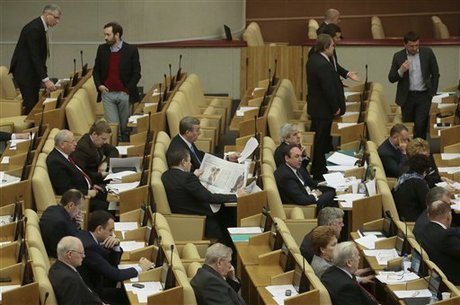Russia Parliament Gives Final Backing to U.S. Adoption Ban
إقرأ هذا الخبر بالعربية
Russia's lower house of parliament gave its final approval Friday to a contentious bill that retaliates against a new U.S. human rights measure by barring Americans from adopting the country's children.
The State Duma passed the bill without debate in a quick 420-7 vote as protesters picketed the building demanding that the measure be voted down.
Friday's vote took place in a largely ceremonial third and final reading of the legislation and the outcome was never in doubt.
"This document forces society and the government to focus on domestic adoption," said ruling party member Olga Batalina.
The Kremlin-dominated upper house of parliament is now expected to approve the ban on December 26 before passing it on to President Vladimir Putin for his signature.
The Russian leader strongly indicated Thursday that he was ready to put his name on the measure so that it could enter law on January 1.
The measure would end about 1,000 adoptions a year and underscores the severity of the recent strain in Russia-U.S. relations.
Caregivers fear the new rules will hit the country's most disadvantaged children, as foreign adoptive parents are often ready to adopt children rejected by Russian families.
The affair has highlighted splits in the Russian government between those who subscribe to strong anti-U.S. rhetoric and those who prefer to cast Moscow as a more reasoned partner that does not favor hostile acts.
Several senior government figures at one stage accused deputies of playing a risky game of populist politics that risked further upsetting relations between Moscow and Washington.
Foreign Minister Sergei Lavrov called the ban "a mistake" -- a rare instance of the country's top diplomat disagreeing with the what appeared to be the leadership's position on of the most controversial domestic issues of the day.
Putin lashed out at the United States once again on Thursday during his annual press conference.
"I understand that this was an emotional response by the State Duma, but I think that it was appropriate," Putin told reporters.
Russia's legislation came after U.S. President Barack Obama last week signed into law the Magnitsky Act -- a measure paying tribute to a Russian lawyer who died in custody in Moscow in 2009 after blowing the whistle on a $235 million police embezzlement scheme.
His employer Hermitage Capital -- once Russia's largest Western investment fund -- and family both believe that he was tortured in prison and eventually died of his beatings.
Russian investigators have dismissed those charges and are still pursuing a fraud case against the late Magnitsky himself.
They have also refused to follow up allegations from Hermitage Capital that some of the most senior security officials -- including ministers -- were involved in the embezzlement scheme.
Russia has used adoption in the past to take out its frustration on some U.S. policy decisions.
Moscow had previously placed moratoriums on adoptions and now issues formal foreign policy statement whenever adopted Russian children are harmed in the United States.
The proposed ban is unofficially called the Dima Yakovlev bill in honor of a Russian child who died of heat stroke while locked in a car by his adoptive US parent in the summer heat in 2008.
The incident did not immediately receive much attention from Russia. But Putin's ruling United Russia party picked up on it because the parent involved was not convicted of any offense -- a case that Moscow said showed U.S. double standards on human rights.
"We had wonderful families from the United States. We have absolutely no complaints about them," said doctor Natalia Karanevskaya of Moscow's children's home number 24.
"They took the most difficult children that would have never been taken in Russia," Karanevskaya told Agence France Presse.
"I think that this law will have its effects."



